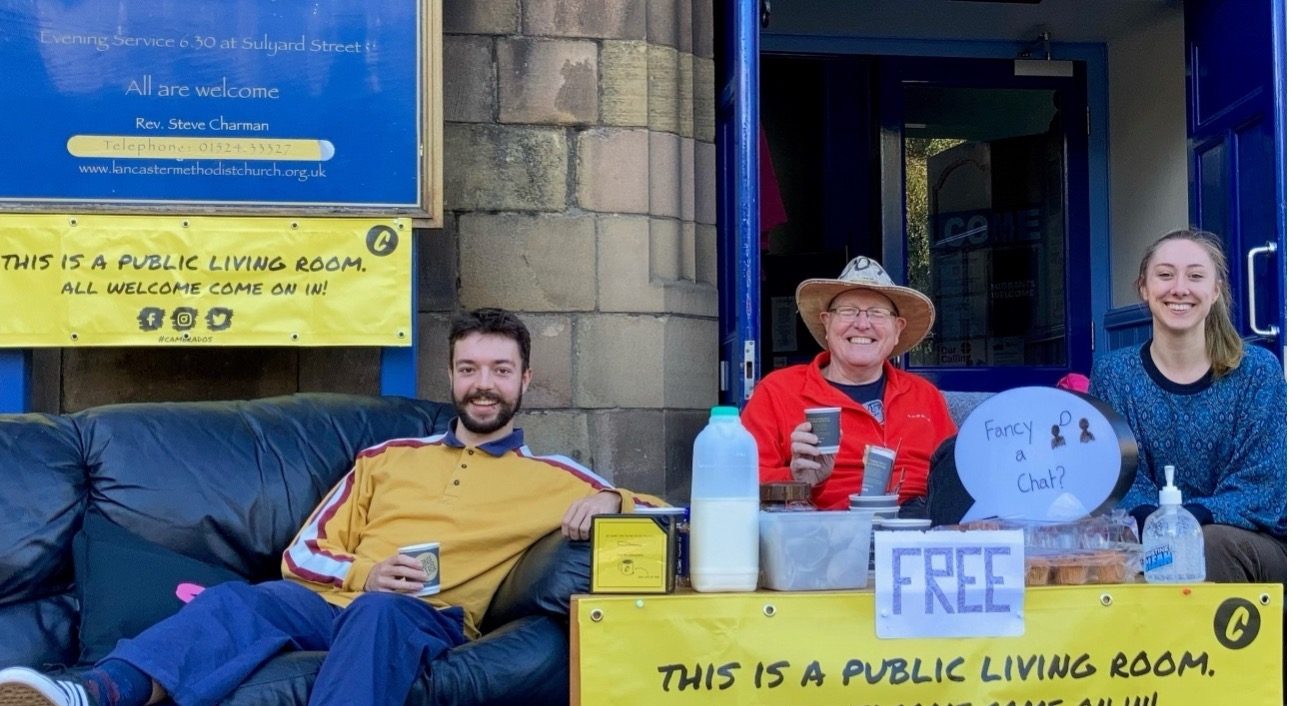Despite being at an early stage of their strategy, it is already having positive results and attracting a good deal of support from local groups and health, social care and wellbeing practitioners. This is because of its positive impact upon the community: engaging people who have been disengaged and disenfranchised by promoting and celebrating their gifts rather than the common “deficit model” which focuses upon their needs.
Lancaster Methodist Church Launches their Listening Campaign
Inspired by the time of year, the team at Lancaster Methodist Centre have started a listening campaign across the community of Greaves to work towards their ‘Fullness of Life Strategy” to move towards a more equitable neighbourhood with better health and wellbeing for all.
Using a community organising approach alongside weekly “Public Living Rooms” and “Street Sofa Conversations” the team at Lancaster Methodist Church are working to increase a programme of deep listening, re-establishing relationships that stalled during the periods of lockdown and supporting safe connections within the community with a view to building back differently and reconnecting neighbours.
Lancaster Methodist Church are committed to this community organising approach, becoming one of our Social Action Hubs just over a year ago, and is using listening to identify how they can further utilise the assets of the Church to strengthen the neighbourhood, particularly after the effects of the pandemic locally.
Even before lockdown they recognised that the area was struggling with the effects of loneliness and poor mental health, and were able to respond by appointing the Centre Manager to look at an appropriate, resident led response. Post lockdown and with a network of over 800 individuals (built up via their online presence during lockdown) they have a small window of opportunity to change the narrative. Focusing this upon the strengths within the community and promoting a strategy that celebrates what they can do together through grassroots leadership tackling the power imbalances that exist.
The community is challenged by a population made up of a large number of single occupancy dwellings, particularly accommodating older people and a large number of students. As they move forward they are working with the University and an Older Persons Housing Association to look at opportunities to collaborate and break down the barriers facing both groups.
An example of their current activity includes a “Lockdown Baby” project that was led by a Mum who was feeling isolated after the birth of her child during lockdown. They supported the Mum by offering space in their buildings for a group to meet. Within a short time the Mum had identified over 100 other families in the same situation and a thriving project developed. Their “Little Pebbles” Toddlers group also encourages interaction between older residents and young families through opening additional volunteering roles, giving an opportunity for the development of meaningful relationships and the sharing of skills and gifts across the generations.
Autumn is the time of the year when it’s good to slow down, taking stock of where we are to look at ourselves, where we’ve been, where we are now and what’s our calling for the future. As we prepare for Christmas there’s time to pause with the rest of nature, resting after a busy period of harvest
In September, as part of the Government Kickstarter’s Scheme and Community Organisers acting as the gateway, they employed 2 local young people as Community Organiser trainees increasing their capacity to develop “deep listening” across the Estate. They also ran a “Miles of Smiles” programme which encouraged the local community to celebrate their neighbourhood by hosting their own picnic and BBQ. As part of this programme they distributed a crate of “hearts” which highlighted favourite places in the community, encouraging people to move them across the area to other places that they loved and to post photos of the new location on social media.
They have also opened the building as an Emergency Response Centre, providing respite and mustering points for those displaced by emergencies including flooding and climate based emergencies, a real issue in South Lancaster due to the number of new developments being built on flood plains and increasing demand on the existing waterways. Through their work they are also supporting local environmental groups and activity including Food Futures, Friends of Burrow Beck, South Lancaster Flood Action Group and Friends of local green spaces.
In early November they hosted a community engagement weekend supported by the ASDA Foundation and the Lancaster Urgent Response Fund, bringing together a Community Asset marketplace. This launched their Church building as an Emergency Response Centre and during the event they organised a “Pants and Tops” activity where residents were able to highlight what they liked and disliked about the area. This information has given them a list of strengths, concerns and priorities for future work.
This intense period of community listening, highlighted a number of key focuses including:
- The provision of a Community-led Coffee Shop as a social meeting space and a hub for community action (69% of respondents)
- Increased access to arts based activity (63% of respondents)
- Youth activities, Youth Club, Homework Club (42% of respondents)
- A space for increased mental health support particularly support for carers and those with a disability (30% of respondents)
- Support for families in crisis including debt advice, access to good food (21% of respondents)
- Increased opportunities for supporting environmental projects and growing projects in the community, particularly protecting and developing green spaces (18% of respondents)
They aim to build upon the existing strengths and passions of the local community, using community organising to build a network of enthusiastic grassroots community leaders learning from local people as community agitators and grassroots catalysts for change. They have been recently selected as fellows in the 2021 Starling Collective cohort and will utilise that opportunity to gain new experience from across the globe whilst sharing the learning within the community and back out across the sector locally, nationally and globally.



